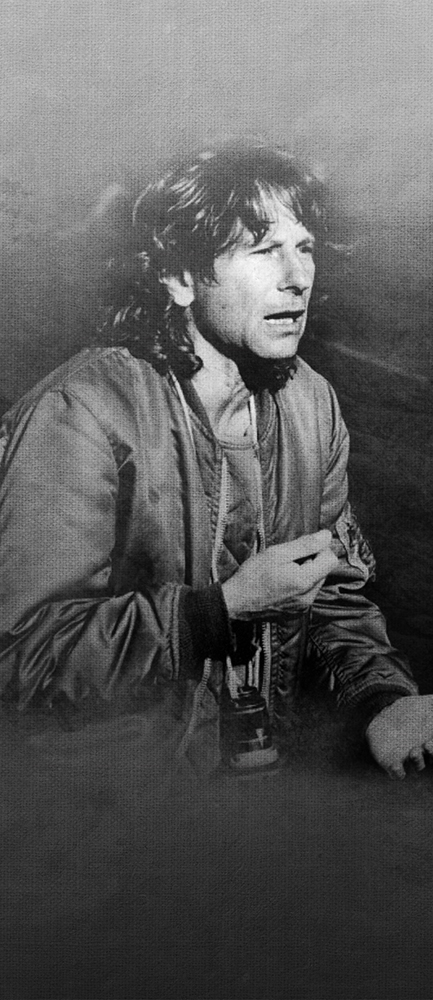
Roman Polański
director, actor, screenwriter and film producer, a 2003 Academy Award winner for best director for Pianist
(born on 18.08.1933 in Paris, France)
The most important thing is to have your head in the clouds – motto of Roman Polański's autobiography entitled Roman, published in 1984.
Roman Polański's great achievements in film make him one of the most well-known and respected film-makers in the world of cinema. The director has received numerous honours and awards, including five Academy Award nominations (one awarded with an Oscar statuette - in 2003 for directing the film The Pianist), a Golden Globe (for the film Chinatown in 1974) and two BAFTA Awards. He also achieved countless successes at European film festivals in Cannes, Venice and Berlin.
Polański was born in Paris, in Polish-Jewish family, as Raymond Roman Liebling. In the late thirties the family of Roman moved to Poland on his father's initiative. During the war, the Polańskis, who were detained in the Kraków ghetto, miraculously escaped their demise (with the exception of director's mother who died in Auschwitz). Roman escaped from the Jewish Quarter before its liquidation and was hiding under an assumed name Wilk, in a small village near Wadowice.
In 1946 Polański, as a thirteen-year boy, got his first acting commission in a radio play, and in 1954 he made his debut on the big screen in Andrzej Wajda's film entitled Pokolenie (Generation), where he played the role of a juvenile hooligan. At the same time, he enrolled in the Film School in Łódź in the department of directing.
During his studies Polański made among others, award winning short film entitled Dwaj ludzie z szafą (Two Men and a Wardrobe). The first feature film by the young director - Nóż w wodzie (Knife in the Water, 1962) was in turn, nominated for an Academy Award, achieving him international fame.
Since the sixties, Polański has been active abroad, directing nineteen films. He stayed in France and the UK, and in 1968 fulfilled his dream of going to Hollywood, where he made horror film Rosemary's Baby (which won two nominations, including one Oscar statuette).
The end of the sixties, however, marked the beginning of personal dramas for Roman Polański. In 1969 Sharon Tate, his wife at the time, was murdered in his own home by members of Charles Manson cult. She was eight months pregnant at the time.
In 1974 Polański filmed Chinatown starring Jack Nickolson in the lead role. The film proved to be a true cinematic hit, resulting in eleven Academy Award nominations (and one statuette - for best screenplay). Soon after the great success, the director was forced to leave the United States. Sex scandal – being accused of raping a thirteen-year model Samantha Geimer - and the spectre of prison, led to Polański establishing permanent residence in Europe, where he has lived continuously since 1978.
The European stage of Polanski's career has also been full of successes. Tess, which appeared in the cinemas already in 1979, won three Oscars statuettes (from a total of six nominations). Since the early eighties, Polański also began to frequently visit Poland - in 1981 he even staged his own theatre performance, Amadeus, in Warsaw's Teatr na Woli.
In 2002 Polański's most famous film – a World War II drama The Pianist saw the light of day. The feature film was shot in, among others, Poland and the UK, and won international recognition, winning Palme d'Or in Cannes, seven Caesars and three Oscars - including best director for Polański himself.
Roman Polański remains professionally active. He is making more films, while being a frequent guest of Polish film festivals.
Do you know?
- Polański was interested in the cinema since the time of the occupation. As a small boy he would peek through a crack in the wall of the ghetto at Nazi newsreels and propaganda films.
- Polański unsuccessfully sought admission to film schools in Warsaw and Kraków. They did not want to accept him because of Roman's father who was a small businessman, considered (along with his entire family) a class enemy of the communist regime.
- During his studies, Polański shot eight etudes and a diploma film. He did not write a thesis in theory and that's why he never received the diploma.
- Lawsuits pertaining the so-called Polański sexual abuse case are haunting him till this day. The director can not go to the United States, where he faces jail. In 2015 Polish judiciary rejected the American court's request for extradition of the film-maker.
- Despite a successful directing career, Polański still episodically appears on the big screen as an actor. He appeared, among others, in the role of Papkin in the film Zemsta (Revenge 2002) - the screen adaptation of the comedy by Aleksander Fredro, directed by Andrzej Wajda.






